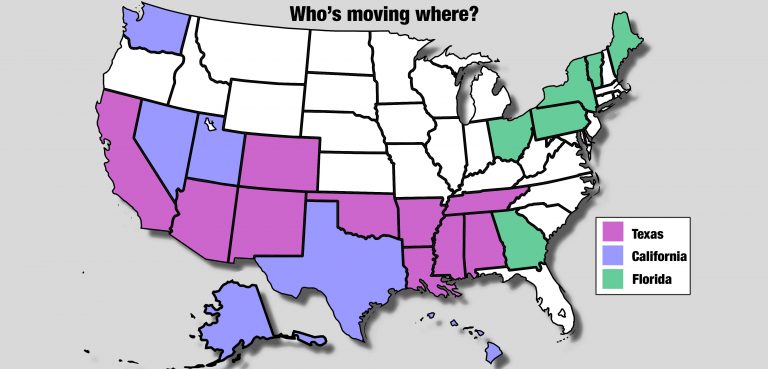Who’s Moving Where: The State-to-State Edition
A state-by-state look at where people are moving.

Net migration is a helpful stat. Which states are gaining and losing population based on more people moving in than moving out. It will show that, for instance, Illinois has lost more than 800,000 residents than it has gained since 1995. That, my friends, is bad news for the Land of Lincoln. Politically, everyone can blame this on everyone else and both sides are probably right to a certain extent because these kinds of situations are complicated.
Why Do People Move? Here Are the Top 5 Reasons for Relocation
Meanwhile, Texas, Florida and a handful of other states continue to hoover up residents from states near and far.
So who’s moving where? For this installment, I looked at the latest state-to-state migration data from the U.S. Census Bureau. However I didn’t look at the net migration, I just looked at out-migration. For each state, I determined which state it was losing the most residents to. Again, we’re talking just out-migration so while Arizona might have lost 35,000 residents to California it also gained 57,000 from the sunshine state. But again, just looking at where people go when they leave we find some interesting trends.
Texas, California and Florida are the big winners. Ten states lose the most residents to Texas and six states each lose to California and Florida.
Where they’re coming from, however, shows some very different patterns. Texas is sucking in residents from neighboring states, likely do to perceived better economic conditions in the rapidly-growing state. California is also drawing from its neighbors, and perhaps for the same reasons as California’s economy has turned around coming out of the recession. Florida, on the other hand is likely drawing in retirees from the aging upper East coast, but also from neighboring Georgia.
The Salary You Need to Buy a Home in 27 U.S. Cities
That leaves the rest of the nation. Turns out, even when people leave a state they don’t tend to go very far. Illinois and Indiana swapped residents – although Indiana gained more than it lost by almost a 2:1 margin. Connecticut residents went to New York, Kansas to Missouri and people flipped back and forth between the Carolinas. Even in migration, the grass is always greener on the other side of the border.
Here’s the full results (again, this is just out-migration, not net)
| People left: | and went to: | How many? |
|---|---|---|
| Alabama | Texas | 8,487 |
| Alaska | California | 35,200 |
| Arizona | Texas | 11,926 |
| Arkansas | Texas | 11,926 |
| California | Texas | 63,591 |
| Colorado | Texas | 18,277 |
| Connecticut | New York | 14,649 |
| Delaware | Pennsylvania | 5,611 |
| Washington, D.C. | Maryland | 17,421 |
| Florida | Georgia | 45,495 |
| Georgia | Florida | 42,020 |
| Hawaii | California | 12,753 |
| Idaho | Washington | 12,825 |
| Illinois | Indiana | 38,177 |
| Indiana | Illinois | 19,221 |
| Iowa | Nebraska | 7,598 |
| Kansas | Missouri | 18,850 |
| Kentucky | Ohio | 18,410 |
| Louisiana | Texas | 23,805 |
| Maine | Florida | 4,293 |
| Maryland | Virginia | 28,071 |
| Massachusetts | New York | 15,222 |
| Michigan | Ohio | 13,480 |
| Minnesota | Wisconsin | 20,758 |
| Mississippi | Texas | 12,308 |
| Missouri | Kansas | 22,240 |
| Montana | Washington | 4,294 |
| Nebraska | Iowa | 8,602 |
| Nevada | California | 29,985 |
| New Hampshire | Massachusetts | 11,177 |
| New Jersey | Pennsylvania | 39,423 |
| New Mexico | Texas | 17,262 |
| New York | Florida | 58,753 |
| North Carolina | South Carolina | 31,188 |
| North Dakota | Minnesota | 8,587 |
| Ohio | Florida | 27,438 |
| Oklahoma | Texas | 25,096 |
| Oregon | Washington | 26,582 |
| Pennsylvania | Florida | 28,841 |
| Rhode Island | Massachusetts | 9,501 |
| South Carolina | North Carolina | 26,379 |
| South Dakota | Minnesota | 4,339 |
| Tennessee | Texas | 15,159 |
| Texas | California | 38,990 |
| Utah | California | 14,273 |
| Vermont | Florida | 2,319 |
| Virginia | North Carolina | 28,250 |
| Washington | California | 32,837 |
| West Virginia | Virginia | 8,620 |
| Wisconsin | Minnesota | 20,375 |
| Wyoming | Colorado | 5,426 |
Source: U.S. Census Bureau.
